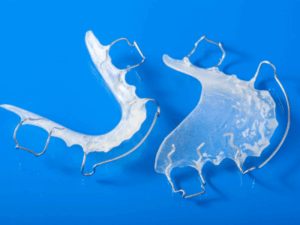
Why Retainers After Braces Are Essential
After months or even years of wearing braces, the day they come off is a huge accomplishment. However, the end of your braces treatment signals the beginning of an important new phase—wearing retainers after braces. Retainers play a vital role in maintaining the alignment of your teeth and ensuring they don’t shift back to their original positions.

What to Expect When Getting Braces as an Adult
Many people associate braces with teenagers, but did you know that about 1 million adults in the U.S. wear them? Braces are not just for kids—adults of all ages can benefit from orthodontics to achieve a healthier and more attractive smile. Whether you’re interested in straightening your teeth or improving your bite, braces can help you at any

Braces or Invisalign for Your Child?
If your child has misaligned teeth, you might be wondering: Should they get braces or Invisalign? The best choice depends on their dental needs, age, and daily habits. Understanding the differences between these treatments can help you make an informed decision. When Should Your Child See an Orthodontist? Orthodontic treatment is recommended when a child has: ✔

How to Know If You Need Orthodontic Treatment
Do you feel self-conscious about your smile or experience discomfort while chewing or speaking? If so, orthodontic treatment might be the solution. At Davoody and Hablinski Orthodontics in Houston, TX, Dr. Amir Davoody specializes in helping patients achieve healthier, more confident smiles using the latest advancements in orthodontic care. In this blog, we’ll cover common signs that indicate

Feeling Confident and Looking Great with Braces
Getting braces is an exciting step toward achieving a straight, healthy smile. However, it’s natural to feel a little self-conscious at first. While you might be eager to improve your smile, adjusting to braces can take time. The good news? There are plenty of ways to embrace your orthodontic journey with confidence! Maintain a Bright, Clean Smile

Ways Orthodontic Treatment Enhances Your Life
Are you or your child thinking about orthodontic treatment? Whether you’re considering traditional braces or Invisalign, the benefits extend far beyond achieving a straighter smile. Orthodontic care can positively impact multiple aspects of your life, making it an investment in both your health and confidence. In this article, we’ll explore six key ways orthodontic treatment can improve your

